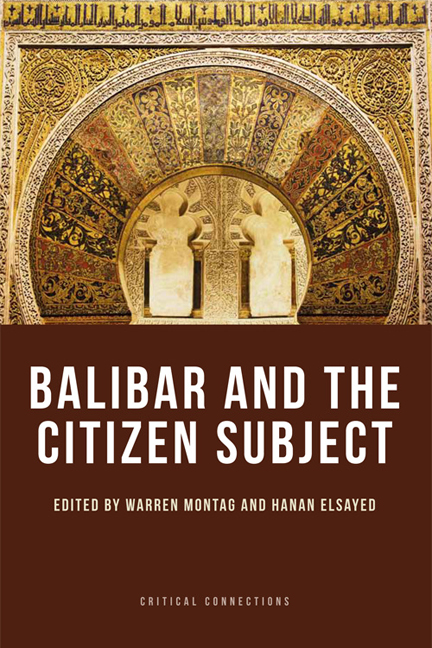Book contents
- Frontmatter
- Contents
- Introduction: Balibar and the Citizen Subject
- Part I Balibar Reading Schmitt Reading Hobbes: Equality or Similitude?
- Part II Transindividual/Universal
- Part III Inequality, Violence and the Possibility of Citizenship
- 8 La Haine: Falling in Slow Motion
- 9 Morbid Perseverance: The Internal Border and White Supremacy
- 10 Just like a Woman: Balibar on the Politics of Reproduction
- 11 Another “Neo-Racism”: Balibar and the Everywhere War
- Notes on Contributors
- Index
11 - Another “Neo-Racism”: Balibar and the Everywhere War
from Part III - Inequality, Violence and the Possibility of Citizenship
Published online by Cambridge University Press: 10 January 2018
- Frontmatter
- Contents
- Introduction: Balibar and the Citizen Subject
- Part I Balibar Reading Schmitt Reading Hobbes: Equality or Similitude?
- Part II Transindividual/Universal
- Part III Inequality, Violence and the Possibility of Citizenship
- 8 La Haine: Falling in Slow Motion
- 9 Morbid Perseverance: The Internal Border and White Supremacy
- 10 Just like a Woman: Balibar on the Politics of Reproduction
- 11 Another “Neo-Racism”: Balibar and the Everywhere War
- Notes on Contributors
- Index
Summary
Yes, we are at war. Or rather, henceforth, we are all in war. But which war are we talking about? It is not an easy war to define because it is formed of various types which have been pushed together over time and which today appear inextricable.
Balibar, “In War”Being in war
The italicized words in this passage from Balibar's own hommage aux victimes du 13 novembre 2015 in Paris, will govern my attempts to answer the question they pose, at least provisionally. It must be provisionally because, if Balibar is correct and whichever war we are in marches sometimes visibly, sometimes invisibly, down an evidently permanent path, I must be thinking and writing this chapter on war, in “war.” “But,” and this is crucial, “which war?” Yes, which, as if to suggest that there are not only many wars afoot at the current historical moment but also various “types” of war, applications and intensities that while commonly violent are applied in unprecedented, or at least unexpected, ways. Beyond the specificity of these wars, the word that in the epigram also conjures the problem of the many, not only as in a multiplicity of wars but also the problem – always upfront in Balibar's large and wide-ranging oeuvre – of the many itself, a mode of political action and (or better, as) a mode of thought. Balibar's longstanding pre-occupation, often in concert with Spinoza, with mass agency, collective organization, repression and most of all, mass resistance, is intertwined just beneath the surface of this short epigram within the difference between being “in” rather than simply “at” war.
Thus, we can say from the onset that the difference with being in war is apposite to the current “conjuncture,” a term in the Althusserian tradition that means precisely the set of relations I just mentioned between the agency of many, relations of force, equality and class division, and knowledge. On that latter term, Balibar insists, the “state of war” today involves “an epistemological discussion of the category of war,” which reveals the “insufficiency of ideal type of dichotomies”: war and peace, civilian and combatant, beginning and ends, state and non-state actors, information about and information as violence. I will open up on all of these below.
- Type
- Chapter
- Information
- Balibar and the Citizen Subject , pp. 309 - 332Publisher: Edinburgh University PressPrint publication year: 2017



